
Burzum was a Norwegian music project founded by Varg Vikernes in 1991. Although Burzum never played live performances, it became a part of the early Norwegian black metal scene and is considered the most influential act in black metal's history. Vikernes has also released five dark ambient and neofolk albums. The word "burzum" means "darkness" in the Black Speech, a fictional language crafted by The Lord of the Rings writer J. R. R. Tolkien. Burzum's lyrics and imagery are often inspired by fantasy and Norse mythology.
National Socialist black metal, also known as NSBM, Aryan black metal, and Neo-Nazi black metal, is a political movement and subgenre within the black metal music scene that promotes neo-Nazism, neo-fascism, and white supremacist ideologies. NSBM artists typically combine neo-Nazi imagery and ideology with ethnic European paganism, Satanism, or Nazi occultism, or a combination thereof, and vehemently oppose Christianity, Islam and Judaism from a racialist viewpoint. NSBM is not seen as a distinct genre, but as a völkisch movement within black metal. According to Mattias Gardell, NSBM musicians see this ideology as "a logical extension of the political and spiritual dissidence inherent in black metal".
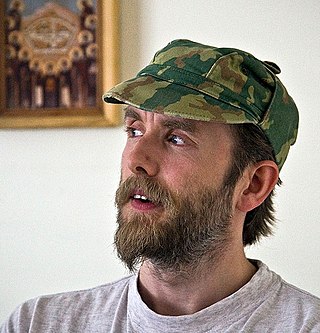
Louis Cachet, better known as Varg Vikernes, is a Norwegian author and retired musician best known for his early black metal albums and later crimes. His first five records, issued under the name Burzum from 1992 to 1996, made him one of the most influential figures in black metal. In 1994, he was convicted of murder and arson, and subsequently served 15 years in prison.
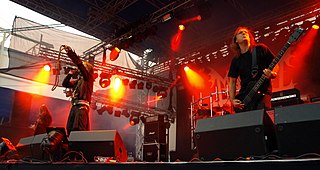
Mayhem is a Norwegian black metal band formed in Langhus in 1984. They were one of the founders of the Norwegian black metal scene and their music has strongly influenced the black metal genre. Mayhem's early career was highly controversial, primarily due to their notorious live performances, the 1991 suicide of vocalist Per Yngve Ohlin ("Dead") and the 1993 murder of guitarist Øystein Aarseth ("Euronymous") by former member Varg Vikernes of Burzum.
The early Norwegian black metal scene of the 1990s is credited with creating the modern black metal genre and produced some of the most acclaimed and influential artists in extreme metal. It attracted massive media attention when it was revealed that its members had been responsible for two murders, a suicide, and a wave of church burnings in Norway.

Lords of Chaos: The Bloody Rise of the Satanic Metal Underground is a book by Michael Moynihan and Didrik Søderlind. It is an account of the early Norwegian black metal scene, with a focus on the string of church burnings and murders that occurred in the country around 1993. A film adaptation of the book was directed by Swedish director Jonas Åkerlund in 2018. The book has been the subject of controversy over the alleged political leanings of author Michael Moynihan, though he denies these allegations.
Thorns is a Norwegian black metal band that formed in 1989 and was part of the early Norwegian black metal scene. They made two highly influential demos in the early 1990s, Grymyrk and Trøndertun, but have only released one full-length album.

Hliðskjálf is the sixth album by Norwegian solo artist Burzum. This album was the second to be recorded by Varg Vikernes while he was imprisoned for murder and arson and also Burzum's second ambient album. Dauði Baldrs and Hliðskjálf were created with synthesized instruments as he was not allowed any other instruments while being imprisoned. For this album, Vikernes was allowed to have the keyboard and recording device for only one week. The first pressing of its vinyl format release was pressed on a shiny burnished color reminiscent of gold.

De Mysteriis Dom Sathanas is the first studio album by Norwegian black metal band Mayhem. Songwriting began in 1987, but due to the suicide of vocalist Per "Dead" Ohlin and the murder of guitarist Øystein "Euronymous" Aarseth, the album's release was delayed until May 1994. De Mysteriis Dom Sathanas is widely considered one of the most influential black metal albums of all time. It is the band's only studio album to feature Aarseth and Varg "Count Grishnackh" Vikernes.

Burzum is the debut studio album by the Norwegian black metal solo project Burzum. It was released in March 1992, through Euronymous's label Deathlike Silence Productions. Six of the songs were later re-recorded in 2010 and released on the album From the Depths of Darkness, as Varg Vikernes was dissatisfied with some of the original vocals and production.

Aske is an EP by Norwegian black metal solo project Burzum. Though recorded in April and August 1992, after Det som engang var, it was released before that album in March 1993, through Deathlike Silence Productions.

Hvis lyset tar oss is the third studio album by Norwegian black metal solo project Burzum. It was recorded in September 1992, but was not released until April 1994, whereupon it was released through Misanthropy Records and Vikernes' own record label, Cymophane Productions.

Det som engang var is the second studio album by the Norwegian black metal solo project Burzum. It was recorded in April 1992 and released in August 1993 through Burzum's own label, Cymophane Productions.
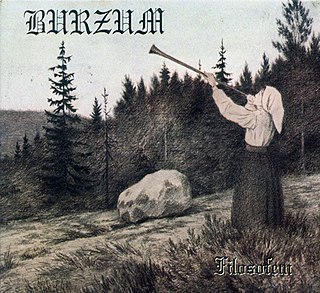
Filosofem is the fourth studio album by Norwegian black metal solo project Burzum. It was recorded in March 1993 and was the last recording before Varg Vikernes was sentenced to prison in 1994; the album was not released until January 1996, however. It was released through Misanthropy Records and Vikernes's own record label, Cymophane Productions. A music video was made for the song "Dunkelheit" and received airtime on both MTV and VH1.
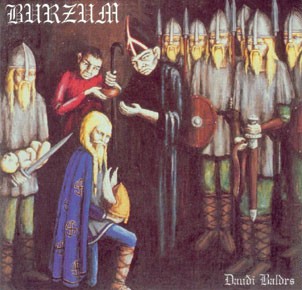
Dauði Baldrs is the fifth album by the Norwegian solo act Burzum. Unlike Burzum's previous work, which was mostly black metal, this is a dark ambient album. It was recorded using a synthesizer and a normal tape recorder by Varg Vikernes while he was in prison, as he was not allowed to have any other instruments or recording equipment. It was completed in a few months due to his limited access to synthesizers, which was also the case with the following album, Hliðskjálf.
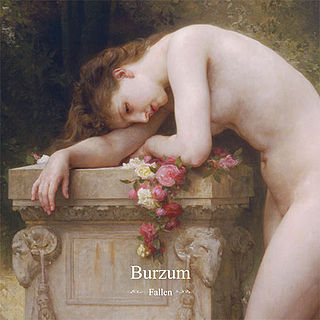
Fallen is the eighth studio album by the Norwegian artist Burzum, released on 7 March 2011 through Byelobog Productions.
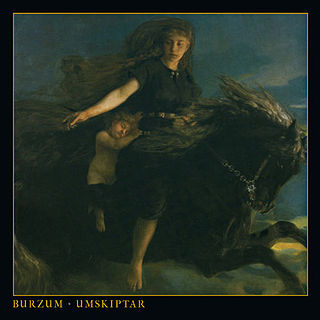
Umskiptar is the ninth studio album by the Norwegian one-man band Burzum, released on 21 May 2012 through Byelobog Productions. It has been described by Varg Vikernes as a "return to the roots", with a priority on atmosphere. The album's lyrics are taken from an Old Norse poem entitled Völuspá. The album was leaked two months before its release date, due, according to Vikernes, to a former PR agent of his having "sent promotional copies of the entire album to left wing extremist magazines" without his knowledge or consent.

Sôl austan, Mâni vestan is the tenth studio album by the Norwegian act Burzum. It was announced in February 2013 and released through Byelobog Productions on 27 May 2013.

The Ways of Yore is the eleventh studio album by Norwegian musical project Burzum, released on 2 June 2014 by sole member Varg Vikernes' label Byelobog Productions. The album retains the ambient and medieval music sound Vikernes started with Burzum's previous album, Sôl austan, Mâni vestan, albeit introducing vocals.
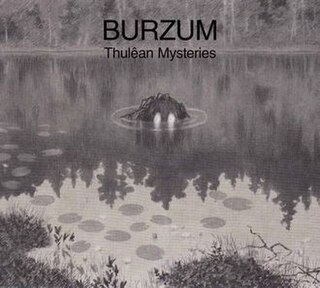
Thulêan Mysteries is the twelfth and final studio album by Norwegian musical project Burzum, released on 13 March 2020 through Byelobog Productions. It is a double album, comprising the sporadic and random tracks written and recorded by Varg Vikernes since 2014's The Ways of Yore.

















